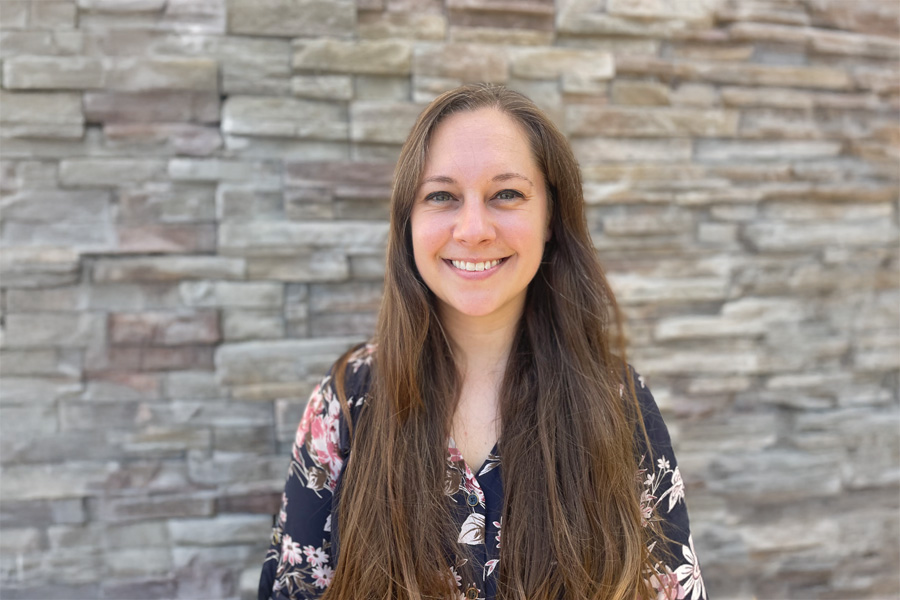Alumni Spotlight: Melissa Ludke

Melissa Ludke is a two-time Florida State University alumna who earned her master’s degree in 2017 and doctoral degree in 2024 from the Department of Classics, part of the College of Arts and Sciences. She currently teaches Greek and Roman mythology and Greek civilization as a visiting assistant professor at Grand Valley State University in Allendale, Michigan. At FSU, she was honored with the 2023-2024 Faculty Dissertation Fellowship in Archaeology and received a travel award in 2024 from the Ermine M. Owenby Jr. Fund to Promote Excellence to advance her research in numismatics, the study of currency including coins, tokens, paper money and medals. Ludke’s dissertation on archaeological excavation in Italy is currently being developed into a book.
Tell us about your background and what brought you to FSU.
I’m from Michigan and grew up in Detroit’s metropolitan area. I earned a bachelor’s degree in anthropology with minors in dance and archaeology from Grand Valley State University in 2012. In 2013, I completed a post-baccalaureate program at Georgetown University in Washington, D.C., studying Latin and Greek to prepare for graduate school. During an undergraduate excavation, I met peers from FSU’s master’s program in classics who first introduced me to the university. I chose to come here for the strong grant and scholarship opportunities available in FSU’s master’s program.
What inspired you to pursue archeology?
Growing up, I was interested in dinosaurs and history. I would spend hours searching for artifacts in sandboxes. The idea of uncovering ancient things, like bones, always fascinated me. When choosing a major, I realized archaeology brought my interests together. Excavation, or the process of digging, understanding human history, and uncovering hidden stories continue to inspire me. I actively participate in archaeological excavations each summer as a key part of my work.
Break down your research for us.
My dissertation focused on the FSU-led Cosa excavations at a site on Italy’s western coast two hours north of Rome. I concentrated on the first century of Cosa’s existence, a period with limited evidence, and studied the socio-economic dynamics between the colony and the surrounding non-Roman towns and cities. I also specialized in numismatics and studied two early coin types, which were the first known artifacts to bear the city’s name. I was drawn to how these coins served as tools of interaction given the scarcity of other surviving records.
What makes you passionate about your research?
I’m passionate about uncovering questions others haven’t asked. For example, while the early Cosa coin types had been studied before, many dismissed the site due to its limited materials and architecture. The site itself was long considered a “typical colony,” used as a model for Roman settlement patterns, but my research supports a divergence from that framework. I follow threads of unexplored ideas and capture the rush of questions before they slip away. Those threads often grow into conference papers and collaborations driven by my passion for digging deeper when answers aren’t evident.
What should the public know about your research?
Archaeology remains vital as new discoveries are made every day, helping us answer questions about the human experience throughout history. By studying the rise and fall of civilizations, we gain new perspectives on our own. Ancient people may seem distant, but they faced universal challenges like plagues, grief and death just like us. At Cosa, we’ve proven the site wasn’t abandoned in the third or fourth century as once thought; evidence reveals a longer, more complex history. There are always new angles to explore.
Tell us about some upcoming projects.
I recently started working as a visiting assistant professor at GVSU. I teach four classes, including two sections of Greek and Roman mythology and Greek civilization. Additionally, I’m converting my dissertation into a book with a publisher already on board, and I’ll be presenting at three upcoming conferences tied to my work at Cosa and dissertation research. I’m also co-editing a book volume on colonial coinage and contributing a chapter to the project.
What faculty or staff members inspired you?
My adviser and professor of classics, Andrea De Giorgi, provided invaluable dissertation guidance and professional support. John Marincola, classics professor emeritus, offered consistent encouragement throughout my doctoral program as well. Finally, graduate student colleagues a few years ahead of myself became unexpected mentors by advising me on the job market, reading my work, and guiding me through my dissertation and defense.
What’s your best memory from your time at FSU?
Some of my best memories come from mentoring students and watching them grow. I once worked one-on-one with a student who had a severe stutter to practice public speaking. By the end of the course, she told me she’d never had an instructor so willing to help. Moments like that — sparking a passion for archeology, seeing students gain confidence, and hearing they learned something meaningful — are what make me feel like I’ve truly succeeded as an educator.
How did your time at FSU prepare you for professional success?
Early teaching opportunities at FSU prepared me for success. In my department, graduate students progress from being teaching assistants to instructors of record, which helped me build a strong teaching repertoire. After graduating in Fall 2024, I was able to adjunct, or teach as a part-time instructor, for two semesters, which gave me the chance to design and teach a new course from the ground up. These opportunities strengthened my teaching skills, prepared me to manage TAs, and ultimately helped me secure my current position at GVSU.
Even though you might miss FSU, what are you looking forward to in this next chapter?
I’m looking forward to transitioning into a full-time role as professor and mentor. I’m excited to return to a place that was so formative for me but this time as a teacher. It feels like a full-circle moment; I’m coming home in a new way.
